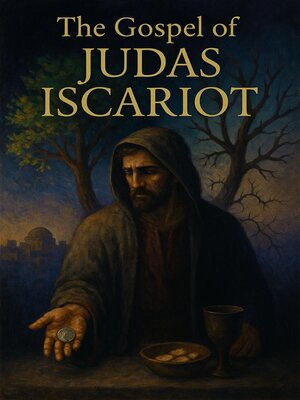
Sign up to save your library
With an OverDrive account, you can save your favorite libraries for at-a-glance information about availability. Find out more about OverDrive accounts.
Find this title in Libby, the library reading app by OverDrive.



Search for a digital library with this title
Title found at these libraries:
| Library Name | Distance |
|---|---|
| Loading... |
What if the greatest villain in Christian history wasn't a villain at all?
The Gospel of Judas Iscariot is a bold reimagining of the most infamous disciple, revealing a man caught not in a simple act of betrayal, but in the tragedy of hope, loyalty, and shattered expectations. This provocative and deeply researched work challenges everything you thought you knew about Judas—and about the story of Jesus itself.
For centuries, Judas Iscariot has been painted as the betrayer, the archetype of treachery. But in this narrative, he emerges not as a monster, but as the most honest—and most tragic—of the Twelve. The story begins not with silver or a kiss, but with an ancient hope shared by millions: that God would raise up not one messiah, but two—a king to restore Israel's throne and a priest to cleanse its temple. This two-messiah expectation, grounded in the Dead Sea Scrolls and prophetic visions, shaped the political and religious imagination of first-century Judea. Judas, a Judean among Galileans, understood this hope intimately. He saw in Jesus the potential for revolution, restoration, and the fulfillment of centuries of longing.
Yet Jesus confounded these expectations at every turn. He fed multitudes, organized crowds in military formations, and then dispersed them; he healed and forgave, but also predicted suffering and death. When Jesus refused to seize the crown or summon the sword, Judas's faith was shaken. Was this the priest, or the king, or something altogether different? And when Jesus fused both roles into himself—becoming at once sacrifice and sovereign—the old hope died. For Judas, the breaking point was not greed, but grief: watching his teacher choose surrender over revolution, acceptance over resistance, and the cross over the kingdom he had promised.
Drawing on the Gospel of Mark's raw narrative structure, this work interprets scripture not just by content but by design—revealing how Mark's literary framing, symbolism, and silence tell a story far more complex than later traditions admit. Each chapter examines the key moments—Judas's motives, the two feedings, the fig tree and temple, the last supper, and the agonizing aftermath. You will encounter a Judas who believed deeply, acted desperately, and ultimately despaired when he realized the story was moving beyond his ability to understand or save.
This is not a defense of Judas. It is not an attempt at absolution. It is a call to witness: to see how proximity, love, misunderstanding, and the weight of inherited dreams can lead even the most faithful astray. The Gospel of Judas Iscariot asks us to consider how we read history's "villains," and whether their stories might, in fact, be mirrors for our own struggles with faith, disappointment, and the temptation to save what cannot be saved.
Lyrical, rigorous, and spiritually daring, this book invites you to sit at the table, dip your bread into the same bowl, and see the story anew—not as a tale of simple good and evil, but as a profound exploration of what it means to hope, to fail, and to find meaning in the silence that remains.







